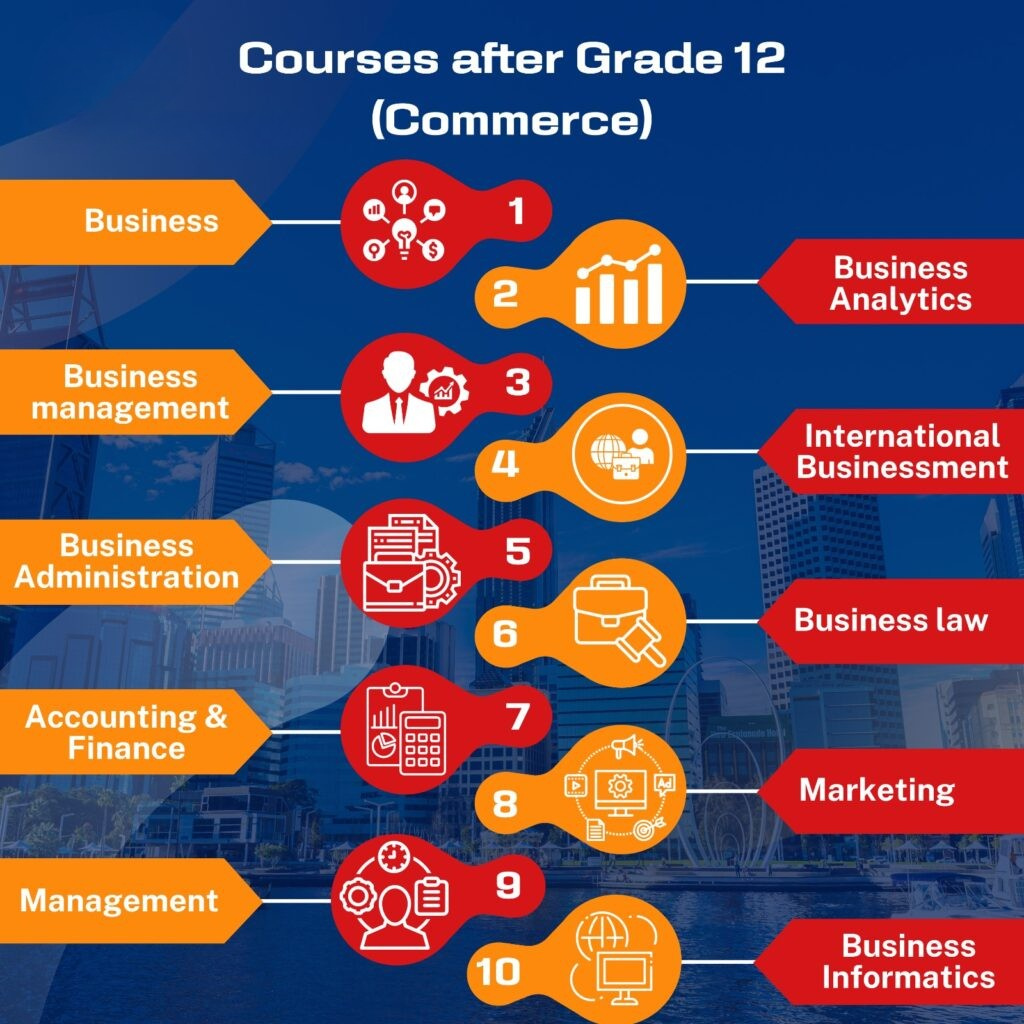Are your commerce student and want to pursue further studies in Australia? Is Australia your favored study abroad country? There are lot of business courses in Australia that students can pick at Australian colleges that will assist to understanding your fantasies- whether you want to become a professional accountant or business expert or start business as an entrepreneur.
Australian colleges offers incredible courses and they something for everybody who want to study in Australia. These courses will help to make strong groundwork in business and furnishes your ability in chosen profession.
Read the blog, to check the popular courses to choose after 12th and in which university to apply.
Why to study commerce courses in Australia?
When it comes to studying business, Australia has lot to offer. Australia s well-known for its high-quality education, careers, and well-known institutes.
This is the reason Australia is becoming the best destination to study after Grade 12:
- Well-Known Institutes:
As per the QS World College Rankings 2023, Australian institute is ranked in top 50 for accounting and finance programs world-wide and positioned 6 in the best 100 business studies.
- Job Prospective:
Graduates in commerce field has strong career in Australia. The position for business and finance experts is rapidly growing, around 95,000 job openings expected over next 5 years.
- Worldwide acknowledgment:
Study business in Australia gives worldwide acknowledgment, as Australian degrees are recognized universally. Also, Australian colleges have solid associations with industry experts which help to open potential doors for temporary jobs, and work positions.
Popular courses in Australia after Grade 12 (Commerce):
Below is the list of some of the popular courses in commerce:

- Business
- Business management
- International Business
- Accounting and Finance
- Business Administration
- Business law
- Marketing
- Business Analytics
- Management
- Business Informatics
- Business:
Students who want to study business has several options such as entrepreneurship, marketing, or finance. It provides full knowledge about business principles and prepares students for diverse roles.
- Business Analytics:
It involves utilizing data analytics and techniques of how to extract the statistics data which help to take business decisions. Students will learn how to solve complex data and improve the performance.
- Business Management:
It focuses on developing leadership qualities and managerial skills to make strategic decisions. They will learn how to plan, organize, and coordinate to achieve the business goals.
- Business Informatics:
It helps to combine the business management and information technology tomaximize decision making abilities. Students will get professional knowledge about technology and data analysis to improve business performance.
- International Business:
As its name suggests student will study about the international trade, diverse culture management & to make strategies. Students will solve the complexities and build career in international business, development and financial.
- Business Administration:
Gives knowledge about management practices and principles. It focuses on the firm’s behavior, planning, marketing and prepare applicants for leadership skills.
- Business Law:
It aims the legal areas such as organization transactions, corporate law & other aspects applicable to the business environment.
- Finance & Accounting:
This program is the combination of the principles of accounting and financial management. Students can excel their skills in taxation, auditing which led to the investment analysis and accounting sectors.
- Marketing courses in Australia:
The focus of the program is to understand the customer behavior, branding and make strategies to promote product/brand.
- Management courses in Australia:
Management skill will help to make decisions for the organization and manage the resources. It focuses on the firm’s behaviour, human resource management and planning.
Top Universities for Commerce Courses in Australia:
| Universities | Courses | Entry Requirements |
| Victoria University | Bachelor of Business in Banking & Finance Bachelor of Business in Financial Management | IELTS- 6.0(no band less than 6) TOEFL – 67 |
| Edith Cowan University | Bachelor of Commerce Bachelors of Marketing, advertising & public relations | IELTS – 6.0 (no modules less than 6) TOEFL- 70 PTE – 57- 64 |
| Curtin University | Bachelor of Business Administration Bachelors of Law Bachelor of Commerce | IELTS – 6.5 (minimum 6 in each module) |
| The University of Sydney | Bachelor of Commerce Bachelors of Laws | IELTS – 7.0 (minimum of 6.5 in each module) TOEFL- overall 96 (20 in Reading, writing) (22 in Speaking & Writing) |
| University of New South Wales | Bachelor of Laws Bachelors of arts & Business | IELTS – 7 (minimum 6.5 in each section) TOEFL – overall 94 (25 in writing) (23 in Reading, Speaking & Listening) |
| Royal Melbourne Institute of Technology (RMIT) | Bachelor of Business in entrepreneurship Bachelor of Applied economics & Finance | IELTS – minimum 6.5 band TOEFL- minimum 79 |
Eligibility Criteria to study courses in Australia after commerce:
The eligibility criteria may vary university to university. Here is the some of the general criteria:
- Applicants should have completed Grade 12 in commerce. Some institutes also mentioned pre-requisite subjects.
- International students must demonstrate English language test scores such as IELTS, TOEFL or PTE.
- Applicants also need to demonstrate education transcript from previous institutions.
Make sure to check all the eligibility criteria or documents once on the university/college official website.
Jobs after commerce courses in Australia:
Australia offers variety of job options in several sectors. Here are some of them:
| Jobs | Roles |
| Accountant | Prepare financial statements.Give financial advice to firm. |
| Financial Analyst | Analyze financial data.Involves in decision-making. |
| Business Analyst | Enhance profitability.Identify spot for improvement. |
| Marketing Manager | Think marketing strategies.Do promotional campaigns about product/brand. |
| Human Resource Manager | Recruit’s employees, evaluates performance. |
| Financial Planner | Creates financial plans, investment strategies. |
| Investment Analyst | Analyze the investment opportunities.Give ideas on investment. |
Still thinking about the popular courses to study in Australia after 12th commerce. Well, there are many courses to choose with specialization in particular field such as accounting, financing and more.
Students can also choose dual degree programs. Australia has top-notch universities with diverse culture. Want to know more about study abroad, get in touch with our expert’s counsellors at DK Visa Consultant
FAQ
Q1. Is Australia being good for studying for international students?
Ans: Australia is known for its well-known for its universities/degrees with cross-culture and career prospective.
Q2. What is the general English test are required to apply for an Australian university?
Ans: Students need to demonstrate English test language score such as IELTS, TOEFL and PTE to apply for an Australian university.
Q3. What is the minimum CGPA for study-visa in Australia?
Ans: The minimum CGPA for study visa in Australia is 65, if students want to pursue an undergraduate course.
Q4. Can students work while studying in Australia?
Ans: Yes, international students can work part-time while studying. They are restricted to work 20-hours a week.
Q5. What type of jobs are offered in Australia after completing undergraduate course in Commerce?
Ans: Australia offers a variety of job options such as Accountant, Financial Manager, Human Resource Manager and more.

